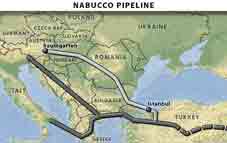NABUCCO debated by video link
By Ernest Petrosyan
Thursday, January 29

“The NABUCCO pipeline would not seriously influence the pattern of gas consumption in Europe due to its insignificant supply capacities,” stated the Director of the Energy and Finance Institute Leonid Grigoriev (Russia). He added that Europe consumes 600-700 billion cubic metres of gas annually, whereas NABUCCO will be able to transport only 30 billion annually, a relatively insignificant amount. He said the project cannot be called anti-Russian due to its insignificant capacity, and that Iran has never planned to become a serious gas exporting country.
“Iran has always had a different plan, i.e. to export oil, keeping its gas for its own internal needs,” stated Grigoriev. He added that the absence of gas producing countries as partners in the project will lead it into a dead end.
The head of the Institute for World Energy Market Studies, Tatiana Mitrova, agreed with Grigoriev. “The project cannot be implemented unless it is economic. Only the wish to implement it is not enough,” she said. Mitrova has stated that the cost of the project had been considered several times and is currently 8 billion dollars. She confirmed that Iranian gas is unavailable, leaving Azerbaijan to take first place in this project.
Azerbaijani expert on oil and gas issues Ilham Shaban said that no conversation about a trans Caspian pipeline can take place unless the Caspian political issue (Nagorno Karabakh) is resolved. He also stated that Azerbaijan has diversified the supply routes for its own gas, and therefore the absence of the NABUCCO project would not affect Baku either now or in the fusture.
Georgian expert on economic issues Liana Jervalidze maintained that the new US administration could significantly influence the prospects of the project’s implementation, “if it alters its policy towards Iran. The project will then bypass the issue of Caspian status by transporting Iranian gas directly to Turkey,” she said. She also stated that the absence of such companies as BP and SOCAR makes the project a paper exercise and less than likely to be implemented. 30% of the project will be funded by NABUCCO member states and the other 70% by the European Bank of Reconstruction and Development.
According to experts there could be some further problems with the NABUCCO project. First and foremost, the global financial crisis might impact on the project’s funding. Second, there are serious doubts as to whether Turkmenistan will export its gas to Europe, because it already successfully exports it to China and Russia.
The participation of Iran was in serious doubt due to the international sanctions against it. However, the Head of the NABUCCO Gas Pipeline GmbH consortium, Reinhard Mitschek, said the NABUCCO pipeline could transport Iran’s natural gas by 2017. Iranian Oil Minister Gholam-Hossein Nozari has stated that it would not be possible to put the NABUCCO gas pipeline into operation without Iran, dismissing any alternative proposal as uneconomical. “If the NABUCCO pipeline comes on stream, Iran will be the sole option for supplying its gas as the country is the world’s second-largest holder of natural gas,” said the Minister, adding however that other countries could also provide some part of the project’s gas.
He stated this after a ceremony this week in which Iran and Malaysia signed a contract to develop the independent fields of Golshan and Ferdowsi.
NABUCCO is not the only proposed gas pipeline under consideration at the moment. Alternative projects include Southern stream and NORD stream, serious rivals to NABUCCO. However these do not bypass the Russian Federation, and thus keep Europe fully dependent on Russian gas supplies.
NABUCCO is intended to transport Caspian and Central Asian gas to Europe through Azerbaijan, Georgia, Turkey, Bulgaria, Hungary, Romania and Austria. It will be a continuation of the existing Baku-Tbilisi-Erzerum pipeline. A consortium, called the Caspian Energy Company, was created in London in December 2008 to construct the NABUCCO pipeline, which will deliver Caspian natural gas to Central Europe through Georgia, Turkey and the Balkans, avoiding Russia. Its members are the Austrian OMV Gas & Power GmbH, the Hungarian MOL, the Bulgarian Bulgargaz, the Romanian Transgaz, the Turkish Botas and the German RWE Supply & Trading GmbH. These hold 16.67% of the shares each. The construction of the 3,300 km pipeline should be completed by 2013.
The Messenger comments: Of course Grigoriev’s position on this project is negative, as this is a response to the desire of the NABUCCO architects to create alternative gas supplies to European countries, which bypass Russia. Russian experts, politicians and special services will do everything possible to encourage the countries and companies enthusiastic about NABUCCO to give up the idea, by quoting spurious arguments framed as objective advice. Western countries and politicians should be very much aware of Russia’s tactics and not follow this advice, which could once again mislead Europe and push it into a Russian trap.
